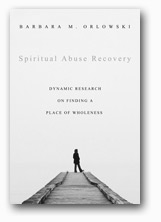Your stories: recovering from religious shame
 Monday, June 11, 2012 at 11:47AM
Monday, June 11, 2012 at 11:47AM 
Before I completely understood my good heart I often felt badly about myself and I didn't know why. In churches I was viewed as someone who was very flawed. I left church on Sundays feeling burdened and tired. This feeling spilled into every corner of my life and I couldn't understand why it was. I knew I was a good person but didn't understand why I felt the way I did.
Church was a hostile environment and I left because the pressure to conform and perform was too much and it felt like I was missing something. In church I was criticized for the way I dress, although relatively modest, and even for wearing red lipstick. I was treated with suspicion and was excluded for that and other things. Things didn't make sense and I felt alone.
Learning about my good and noble heart put a name to the bad feelings I had. It helped to to recognize the teaching that I had heard for so long and that had impacted me so badly. As I understood what Jim teaches more deeply I was freed from the burden of feeling like I was not good enough and that suspicion that I have encountered in churches. My self-esteem has improved and I feel genuine joy in freedom in understanding the true message of Christ and the truth of who I am. I am free from hostile judgment and burdens and most importantly I am healed from that old belief!
..................................................................................................................
This is Amy's story of how an introvert experienced the hyper-drive, push and pressure environment all too common in performance-based churches:
Amy's story [how an introvert experienced "church":
My story is going to focus more on the extra difficulties that introverts encounter in today's performance-based religious institutions. The ones I ended up in, largely by default, were big, showy, noisy environments. The ones who looked the happiest, sang the loudest, had their hands up highest and prayed the most 'spiritual' sounding prayers were lauded as 'spiritual leaders.'
Unfortunately, for years all I got was the message that I wasn't good enough. The church institutions I was involved were all well-propped up by natural achievers who thrived on always doing more. I often encountered teachings and articles written by blazing extroverts that said do more, work harder, run faster, keep up the good walk for Jesus! Remember, He's keeping your scorecard and you want to hear Him say, Well done, good and faithful servant! You don't want to be one of the ones that hears, Depart from me, I never knew you!
This type of religious environment cuts especially deep with introverts. We tend to be more sensitive by nature, and more deeply internalize the arrows hurled at us by the enemy, who unfortunately finds his job all to easy to do through the hands of often well-meaning religious leaders. We also find it more difficult to find a place to belong in the midst of the frenetic activity and performance of today's average church institution.
So these years left me with so much shame that I thought I was going to have a nervous breakdown until years later, I finally began doing some serious internet research and found better answers. Jim's book was one of the tools that God used to show me how many poisonous lies with a "Christian" label that I had been fed. Thankfully, one book I have greatly benefited from is "Introvert Power" by Laurie Helgoe.
I am not "all the way healed" but it is a journey. I am so much healthier and more whole than I ever was during the days I was being told that my heart was not good and that there was always one more thing I had to do to try and earn God's favor. Now I am creating my own space and my own ways to be an introvert IN Christ, not an extrovert always doing things 'for' Him. I ponder. I create. I write. I work on and share music. I connect more closely with others one-on-one however I can, one of the things I do best. I do things for others that are uniquely me, but were never valued by the institution. I am learning that being an introvert the way God made me is just fine, and there may be reasons for it that I haven't even discovered yet.
..................................................................................................................
SHARE YOUR STORY: If you'd like to share your story here with others about recovering from "bad heart" messages and the discovery that your new Christ-shaped heart is good and noble, send me an EMAIL
GET JIM'S BOOK: To read more stories of people who were shamed under a "bad heart" or "wandering heart" message, you can also read my book, "RECOVER YOUR GOOD HEART."

















